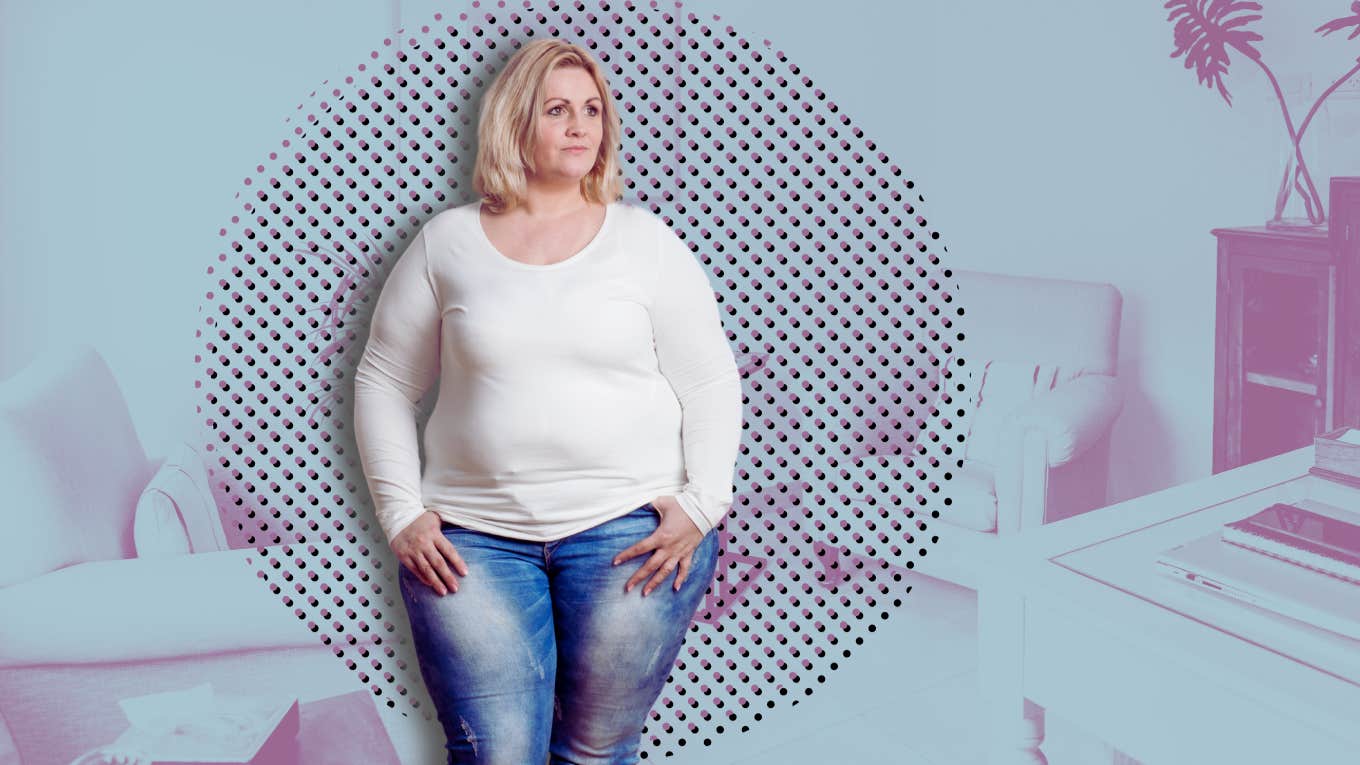The Hidden Risks Of Being A Fat Woman In Therapy
Not all therapists are aware of this, and it can have devastating effects.
 halfpoint and Paz Ruiz Luque from Getty Images Signature
halfpoint and Paz Ruiz Luque from Getty Images Signature Stupid. Ugly. Sloppy. Lazy. Undisciplined. Fat.
These are all words frequently used to describe people who are overweight or obese in Western cultures.
A special issue of "Women & Therapy" titled, "Make Space for Every Body: Ending Sizeism in Psychotherapy and Training," tackles the important topic of weight stigma and its existence in psychotherapeutic practice.
What is weight stigma?
Commonplace in the United States, weight stigma refers to negative beliefs associated with being obese or overweight that emerge in a culture that is sizeist.
For example, overweight and obese individuals are frequently described using a slew of negative attributes (from smelly and unstylish to lacking in moral integrity). Such negative beliefs about overweight individuals often result in weight-based discrimination, or the maltreatment or disenfranchisement of individuals due to their weight.
Weight Stigma in Mental Health Professionals
Given that weight-based teasing and discrimination are associated with poor psychological health outcomes in people of all ages, including depression, poor self-esteem, and eating pathology, one might assume that mental health professionals would not hold anti-fat attitudes.
Psychologists are, in fact, ethically responsible for the health of our patients and for creating a non-judgmental therapy environment that is free from societally-based bias.
Yet, emerging data suggests that is not the case.
Many articles in the special issue of "Women & Therapy" demonstrate that anti-fat attitudes and behaviors reflective of weight bias are evident among professional mental health practitioners, even in those with expertise in treating eating pathology.
For example, in a case study examining interactions between a patient with an atypical presentation of anorexia nervosa and her primary therapist in an inpatient setting, Harrop described how weight bias in the therapist contributed to the patient’s denial of her illness and severe ruptures in the therapeutic alliance.
Similarly, my colleagues and I qualitatively explored 15 obese women’s experiences with weight-based microaggressions in psychotherapy (mean BMI = 41.52).
Although few mental health providers openly endorse holding anti-fat attitudes and discriminatory weight-based behavior, they can communicate negative weight-based messages to patients indirectly through microaggressions, which are subtle, often unintentional expressions of negativity toward individuals due to their membership in a marginalized group.
Our data indicated that the most common microaggressions identified by study participants included therapists who focused too much on the client’s weight; therapists who appeared to be less interested in clients because of their weight; and, dissatisfaction with waiting room seating options.
Participants also indicated that their weight affects therapy sessions such that they are less forthcoming or more evasive in therapy.
In addition, weight stigma research consistently finds that healthcare professionals in other related fields (e.g., physicians, nurses, dietitians) hold biased attitudes and beliefs about obese patients. Healthcare providers often characterize obese individuals as unmotivated and non-compliant; blame them for their weight; and, demonstrate implicit anti-fat attitudes.
Recommendations for Therapists and Clients
The truth is that we live in a culture where sizeism and weight-based discrimination are highly prevalent and relatively socially acceptable. As such, mental health professionals were likely conditioned to believe that obese individuals are personally responsible for their weight problems because of laziness and overeating.
Consequently, mental health professionals need to educate themselves about sizeism and actively work to avoid enacting it in the therapy office, as they are likely to perpetuate weight stigma unknowingly.
Various articles in this issue of "Women & Therapy" offer recommendations about how to tackle weight stigma in the therapy office.
In addition to the general rule of monitoring your own bias and not intentionally shaming a client for their body size, two general suggestions for mental health and medical professionals are:
1. To make the office a safe, accepting, non-judgmental space for clients of any body size or shape.
2. To not assume that “weight” is an issue for clients that they want to work on in a therapeutic context (whether they are overweight or underweight).
Mental health professionals are not immune from intentionally or unintentionally communicating anti-fat attitudes to their clients.
Given that weight bias and discrimination are commonplace in mainstream Western culture (and may even be internalized by overweight and obese clients), it is critical for mental health practitioners to tackle weight stigma personally and professionally.
The American Psychological Association’s practice guidelines for the treatment of obesity and overweight children and adolescents should be integrated into any practice that involves obese youth.
For patients who are on the receiving end of weight stigma, developing an open dialogue with your therapist about your relationship with them can be daunting. Especially if you're feeling uncomfortable or that they may hold some anti-fat attitudes or weight stigma themselves.
As difficult as it may be, I suggest taking the risk of opening up. It can even start by acknowledging how hard it is to bring up.
Try saying something like, "It's hard for me to talk about my relationship with you, but I want to share that I've felt uncomfortable with you sometimes. Specifically, how you look at my body or how you talk about weight or ... (whatever you as the client notice)."
Ideally, this opens up an honest dialogue with your therapist about how weight and physical appearance are experienced by each of you in the therapy room.
Cortney Warren, Ph.D., ABPP, is a clinical psychologist and adjunct professor of psychiatry at the University of Nevada Las Vegas (UNLV). She is also the author of Letting Go of Your Ex and Lies We Tell Ourselves.

